Sunday Feb 15, 2026
Sunday Feb 15, 2026
Friday, 2 December 2022 00:00 - - {{hitsCtrl.values.hits}}
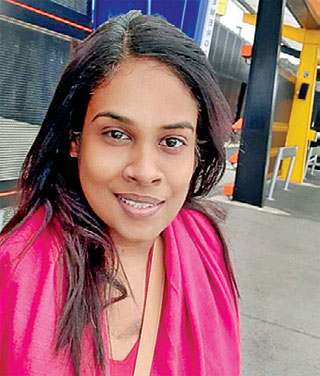
Chani Jayathilake
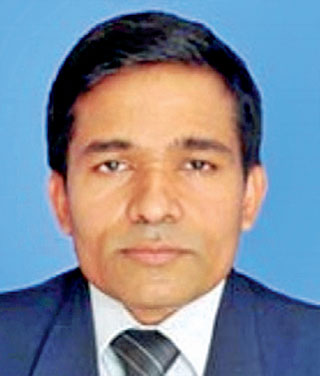
Dr. Janaka Jayalath
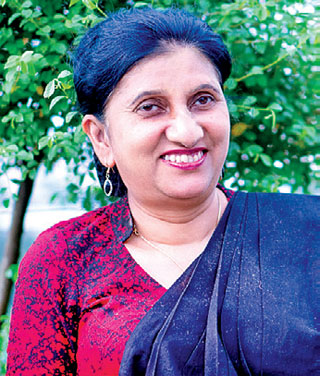
Manique Gunaratne
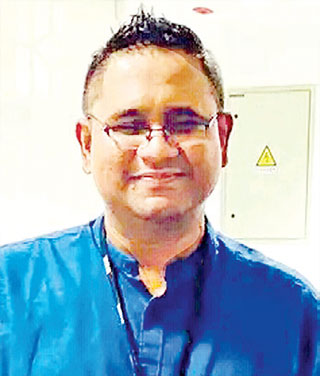
Tharidu Rajamanthri
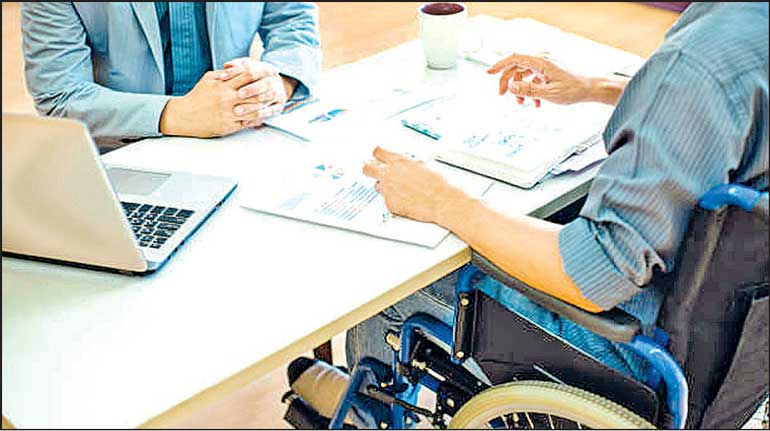
Celebrating ability
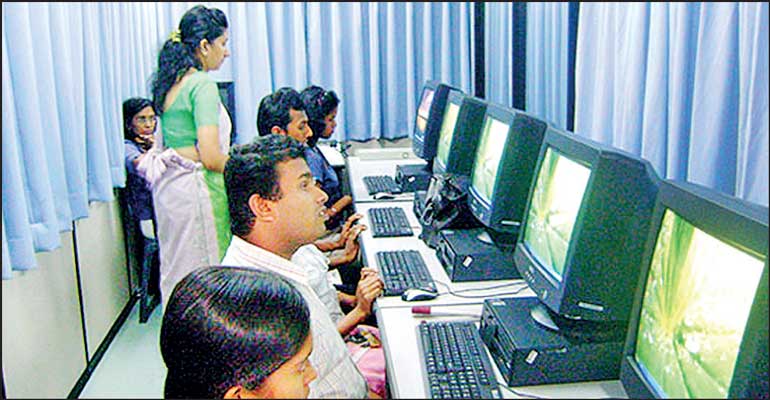
Manique teaching ICT to those with diverse disabilities to enable better employment
|
International Day of Persons with Disabilities falls on 3 December. This year’s theme is ‘Transformative solutions for inclusive development: The role of innovation in fuelling an accessible and equitable world’
By Randima Attygalle
English theoretical physicist, cosmologist and author Stephen Hawking who emerged a role model world over for people with disabilities, once said in an interview with the New York Times: “My advice to other disabled people would be, concentrate on things your disability doesn’t prevent you doing well, and don’t regret the things it interferes with. Don’t be disabled in spirit, as well as physically.”
People with disabilities make up an estimated one billion, or 15%, of the world’s population. Of this one billion, 80% live in developing countries according to WHO statistics. The number of people with disability is dramatically increasing due to demographic trends and increasing chronic health conditions among other causes, points out the WHO. According to the census and statistics report of 2012, the number of persons with disabilities in Sri Lanka makes up 8.7% of the population.
Inclusivity and a shift in attitude
About 80% of the world’s population with disabilities are of working age. The right of people with disabilities to decent work, however, is frequently denied, as the ILO notes. People with disabilities, particularly women with disabilities, face enormous attitudinal, physical and informational barriers to equal opportunities in the world of work. Compared to non-disabled persons, they experience higher rates of unemployment and economic inactivity and are at greater risk of insufficient social protection that is a key to reducing extreme poverty according to the ILO findings.
The ILO report, ‘Making sure that the work in the future is better and fairer for people with disabilities’ (July, 2022) says that although many people with disabilities in the world are not working or do work that pays them very little, they do have important skills and things they could do and that work can help people with disabilities to have a good life. Inaccessible buildings, unfair societal attitudes about people with disabilities that ‘they cannot do much’ often prevent them from seeking productive work, the report says.
Among the recommendations of the ILO report to harness the skills of people with disabilities are to enact laws and rules about new types of jobs and new ways of working, ensure that the laws and rules include people with disabilities, support organisations to give more jobs to people with disabilities, ensure that organisations include people with disabilities in their work and plans and give people with disabilities get extra support to work in a job if they need it.
The UN Convention on the Rights of Persons with Disabilities (CRPD), which entered into force in 2008, is a key international instrument on disability which Sri Lanka ratified in 2016. However, this UN Convention is yet to be implemented in Sri Lanka and still remains a pipedream for our people with disabilities.
The Disability Rights Bill which was drafted in 2006 to add provisions to safeguard the rights of persons with disabilities has not been adopted by parliament so far. 1988 Public Administration Circular No. 27 instructs that 3% of vacancies in public services and public companies should be filled by persons with disabilities ‘possessing requisite qualifications and whose disabilities would not be a hindrance to the performance of duties.’
Accessible learning formats
Internationally reputed activist for people with disabilities and the Manager of Specialised Training & Disability Resource Centre of the Employers’ Federation of Ceylon (EFC), Manique Gunaratne says that lack of education and vocational training, over protection by families and financial barriers prevent people with disabilities from becoming productive partners in the Sri Lankan labour force. “Presently only 21% of them engage in work according to 2012 census,” says Manique who also alludes to lack of training material in accessible formats and dearth of professionals such as mentors, sign language interpreters to assist hearing-impaired people and assessors.
“In our training centre at the EFC, we ensure all participants get training material in six accessible formats which include Braille, large print, audio format, accessible e-copy, sign language and simple text for those with learning disabilities. Along with the courses we develop the softs skills, language and technological skills of our participants to mould a fully-fledged employee that the private sector would be interested in recruiting.”
Revamping vocational learning
For better employability, exposing people with disabilities to the current job demands is imperative, says Manique who calls for revamping of the present vocational curriculum. “Vocational courses should enrol people with disabilities without discrimination without limiting them only to underpaid vocations and most importantly courses should be geared to meet the job market.”
Having lost her vision to Retinitis Pigmentosa in her late 20s, Manique herself debunked the deeply ingrained local myth that the vision-impaired could do no better than making joss sticks and lamp wicks. Getting herself equipped with ICT skills, Manique asked for just one chance from the then DG of the EFC in 2001 to prove what she was capable of. “It is this one chance that many in my situation are deprived of sadly,” recounts Manique who went on to climb up in ranks to become what she is today, changing countless lives of those with disabilities.
The UNDP-supported project to sensitise local government authorities on disability accessibility, to which Manique lends her advocacy expertise, also seeks to generate more employment and job-oriented vocational training opportunities for those communities. Enabling connectivity through e-learning centres of the local government authorities for remote training in ICT and other skills and creating systems to disseminate information about education and employment opportunities and empower officers at ground level are among the other key features of the programme.
Upskilling and reskilling those with disabilities to fit into the modern world of work is a cause Manique champions though all her labours. “In terms of the job placements in the private sector, one of the biggest bottlenecks is the lack of English language proficiency.”
Empowering families
Empowering families with children with disabilities is the first step in assuring the quality of their lives, says Manique who lobbies for a special desk to guide and assist parents. “When a child with a disability is born to a family, parents become helpless not knowing where to turn to. The first place they seek help is the hospital and it is crucial that a special information desk is set up at least in every base hospital in the island to assist parents so that their child can one day be empowered to come out of the sympathy mode and be developed to reach their true potential.”
‘Never give up as nobody is helpless’ is the winning mantra of Tharidu Rajamanthri who was mentored by Manique Gunaratne at the Specialised Training & Disability Resource Centre of the EFC and is now an accomplished young professional working for the British Council in Sri Lanka. Tharidu, 36 now, having lost his vision at 16, came under the wings of Manique who imparted ICT skills to young Tharidu in several IT courses designed for people with disabilities.
Today the Operations Officer at the Teaching Centre of the British Council in Colombo, Tharidu is gainfully employed exposed to a cross-cultural setting. “Empowerment of people with disabilities should ideally begin at home. Sadly, many children and youth are hidden behind doors in fear of social stigma and also lack of information regarding their education, especially at rural level,” says Tharidu who counts his blessings having come out of the shell he went into after his vision loss. Tharidu’s proficiency in English and his other skills set are an index that given the right exposure, those with disabilities need not necessarily succumb to a life of complete dependency.
|
Employability skills training
Realising her dream of doing higher studies in a foreign land, Chani Jayathilake, 39, has just started reading for her Master’s in Disability Studies and Policies on a scholarship she won to the Flinders University in Adelaide, Australia. Born without both her arms, Chani was supported by whom she calls her ‘silent group of supporters’ including family, teachers and friends to chase her dreams. “People often associate charity with those with a physical disability, especially back at home. This mindset should no longer have a place in a world where a rights-based approach is adopted towards those with a disability,” says Chani speaking to the Daily FT from Australia.
Capable of doing all her daily chores with her feet, Chani feels blessed to have come under the correct mentors at the correct time. Thanks to her teacher Sunethra Weerasinghe who first guided Chani to be empowered, she extends her thanks to her other mentor Manique Gunaratne who enabled her a lifetime opportunity of studying in Australia.
Chani, a product of the University of Colombo was employed at MAS Holdings prior to leaving for Australia for her Masters. Upon her return she aspires to develop an Employment Action Plan to mobilise skilful youth with disabilities at village level. Chani’s travels to Canada and several other European countries have given her the exposure and experience to replicate good systems in Sri Lanka especially in terms of upskilling and reskilling those with disabilities through an Employability Skills Training initiative which she yearn to realise for her home country.
“Accessibility and public transport still remain unsolved issues in Sri Lanka which are incorporated in the developed part of the world at policy level,” remarks Chani who urges employers and society at large to look at the ‘ability’ of a person instead of the disability. “I’m what I am because people who crossed my path cheered me to greater heights looking only at my ability,” Chani adds.
Reasonable adjustments
The recent policies issued by the Tertiary and Vocational Education Commission (TVEC) promote training of persons with disabilities within mainstream vocational training institutes and support the transformation and incorporation of disability specific technical and Vocational Education and Training (TVET) programs into NVQ framework.
To further improve the participation of persons with disabilities in NVQ training courses, TVEC has introduced ‘reasonable adjustments’ in NVQ assessment for candidates with disabilities. “The objective of these reasonable adjustments is to enable equitable assessment of the candidates with disabilities, without compromising the competency level of the qualification. This initiative is also a means of encouraging more candidates with disabilities to obtain NVQ qualifications,” says TVEC Deputy Director General Dr. Janaka Jayalath.
A user-friendly toolkit was designed to support NVQ assessors to successfully implement the concept of reasonable adjustments when engaging with candidates with disabilities, by providing a wide range of visual and practical examples according to the types of disability and training course. The toolkit was designed with the support of The Skills for Inclusive Growth (S4IG) program which is an initiative of the Australian Government in partnership with our State Ministry of Skills Development, Vocational Education, Research and Innovations.
Toolkit to support assessors
The staff and assessors of TVEC-affiliated training centres are expected to use this new toolkit and encourage persons with disabilities to engage with training and appear for the assessments with confidence. “Today even unit competence is recognised by the TVEC and ‘Record of Achievement’ is issued to candidates who are unable to complete a full qualification. We have also conducted several training sessions for the assessors, some of them who have disabilities themselves,” remarks Dr. Jayalath who goes on to say that reasonable adjustments also aspire to integrate candidates with disabilities to mainstream learning. “Right now the visibility of the candidates with disabilities in the NVQ framework is not very significant and in order to attract more numbers, TVEC is also planning to make training centres more accessible by them,” Dr. Jayalath remarks.
Sharing the share
Dismissing the term ‘people with disabilities’ G.P.M. Gamage, a lecturer from the Sri Lanka Institute of Tourism and Hotel Management and TVEC, identifies them as ‘people with different abilities’ who can be productive partners in the workforce. “The opportunities for them in the leisure sector are enormous ranging from travel to in-house hotel management operations and if we can tap the skill at the grassroot level, we can change so many lives, while generating so many job opportunities,” reflects Gamage who believes in the idiom- ‘sharing the share’.
He goes on to note that a physical disability is no ticket to impede their intellectual capacities. “The right attitude of employers and other policymakers and society in general is all that takes to integrate physically-challenged communities into the mainstream and make them feel that nobody is left behind.”